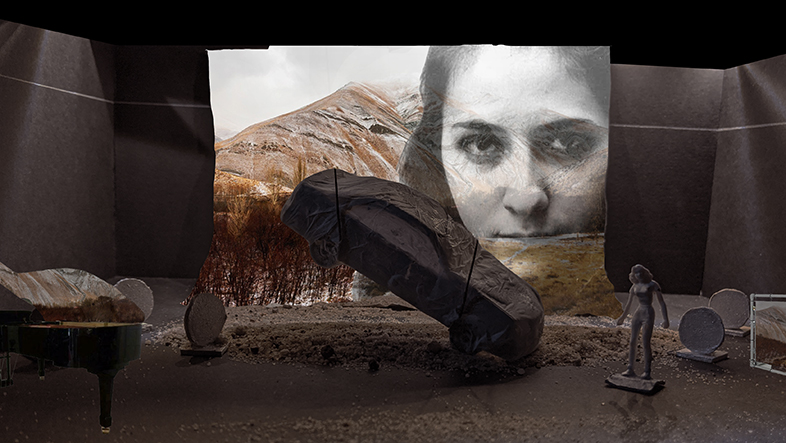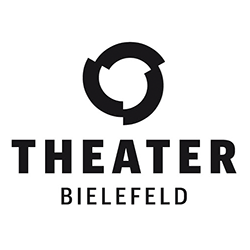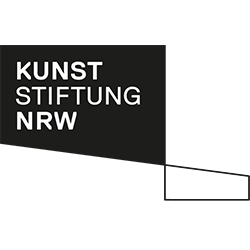I Am Carmen
I AM CARMEN من کارمن ھستم an that's not a love song
Musical theatre after Georges Bizet
by Hasti Molavian, Pia Dederichs, Kai Meyer, Paul-Georg Dittrich, Isabelle Becker, Christopher Scheuer, Tobias Schwencke
At the centre of the music theatre project ICH BIN CARMEN is the mezzo-soprano Hasti Molavian, who was born in Iran and trained in Germany. Her autobiographical experiences are linked associatively with the themes and motifs from Georges Bizet's opera Carmen: Dreams, the urge for freedom and fears of a scarred past. Molavian, Dittrich (direction), Meyer (video), Dederichs (stage) and the composer duo Scheuer/Schwencke interrogate the narratives of both worlds for images of society and gender and design a utopian counterworld: between Bizet and Persian chant "Naghali", original Tehran locations and a poetic memory space.
The STAGE SPACE in which I AM CARMEN will take place will be an associative space that sensually connects the worlds of Bizet's Carmen character and Hasti Molavian. The stage floor will be covered with sand, which will be in constant motion due to wind machines and sand trickling from above. In this way, new landscapes, levels, traces and images will constantly emerge. Above the sandy desert will be a gutted car (in keeping with the emblem of Iranian film director Abbas Kiarostami, who uses vehicles as settings for his characters. "We look out the side window and through the windscreen at what they see. So we see Iran as they see it.") that serves as a projection surface, can be moved via the stage machinery into different images / constellations and can be played by the singer. The floor will be covered with a painted floor cloth under the sand, which can be moved upwards via a rear hoist,
thereby changing the sand landscape and allowing the painted motif to become visible; here we are thinking of the traditional Persian storytelling method "Naghali", in which the stories are always supported by Persian painting. This grotesque-installative desert-soul landscape opens up poetic scope for the protagonist by means of textures and materials from the Persian cultural area and is further completed by a concert grand piano and a technical platform with live electronic equipment, which are integral parts of the stage space. In addition, film feeds from Iran will build a visual bridge to the local reality of life as a space of memory. This film material will be produced by a camera team led by Kai Wido Meyer and Hasti Molavian at original locations in Iran.
We understand the opera "Carmen" by Georges Bizet with its well-known melodies as a topos, as an extremely popular sound block from which we extract pieces, like in a quarry. The selection of individual pieces results from the examination of the basic idea. In turn, individual fragments are enlarged into collages with live electronics. Individual numbers will change in constant development, "morphing" into new states. The "Chanson Bohème" from the second act, for example, is gradually transformed into Arabic electro-chaabi. In these processes, arrangement slowly becomes composition. Musical styles from European classical music to Arabic pop, musical-cultural identities become compositional material and can thus sonically-poetically depict and reflect the protagonist's life worlds: Fragments of the "Carmen" original, field recordings and original sounds from German and Iranian society, from the spoken word to contemporary music, are put together in a completely new and independent way by live electronics, video sound, piano and vocals.
Apart from the protagonist's voice, a grand piano is the only acoustic instrument on stage. Sound noises through extended piano playing inside the instrument and preparations of the strings break up the traditional opera gesture here as well and form a connection to the live electronics.
In its simplest form, LIVE ELECTRONICS joins singing and grand piano as a further instrument. Like the latter, it is placed on the stage together with the "player" and integrated into the action there. In addition to its function as an independent sound generator, it draws live on the acoustic material of its playing partners and also uses samples from the Carmen discography. She quotes and builds spaces with concrete sound figures, comments on and constellates set pieces from biography and opera, loops, remixes and exponentiates.
The mezzo-soprano has access to the live electronics via a wireless SENSOR-HANDSCHUH and other controllers and can initiate her own scenic processes and, for example, vocally and musically "morph" into other personalities. The sensor technology links the control data with individual parameters of the sound production and/or interprets them in the sense of a gestural sample trigger. As a symbol, the glove refers to the tradition of falconry: this appears both in the Persian fairy tale of the king and his falcon, as well as in the poetry of Iranian modernism by Forugh Farrochsād and in Bizet's Habanera.
The eye is the window to the soul. We look at the world through a wafer-thin lens. Is this image reality or rather a distorted picture? What happens at breakneck speed in our heads is also encountered in the world around us. One mirror makes us look good, the other does not. Every translucent object distorts the image that passes through it. Just as our thoughts, our memories are coloured by us.
In the VIDEO CONCEPT we want to make this window, this lens that lies between reality and our perception, the subject. Am I sitting in front of the window or behind it. On which side am I standing. Am I looking in or out?
Within the staging, the video makes an attempt to point out an immersive connection between the theatrical 'reality' and the cinematic reality. A transitive space emerges, an image of the Iranian homeland. The visual worlds oscillate iconically and quote-like between cultural worlds and identities. The medium of film becomes a concrete means of staging by imagining a window into real life worlds. And this in the literal sense. An image, as blurred as a German in Iran can make it. The country that is home to many is equally a stranger. A camera will accompany Hasti Molavian to Iran to collect film images at original locations for the video work for the production.
The Iranian mezzo-soprano, born in Tehran in 1988, studied singing with Rachel Robins at the Folkwang University of the Arts Essen and completed master classes with Andreas Homoki, Angelika Kirchschlager, Anja Harteros, David Freeman, Helen Donath and Olaf Bär. During her studies she received the NRW Scholarship, the Germany Scholarship and scholarships from the Charlotte and Walter Hamel Foundation and the Rotary Club. From 2011 to 2015, Hasti Molavian was a member of the Opera Studio of the Dortmund Opera. At the same time, she made guest appearances at the Hagen Theatre as Cenerentola (Rossini), among others. She is also intensively involved with contemporary music. For example, she has sung "Pierrot Lunaire" by Arnold Schönberg as well as works by Luigi Nono, Helmut Lachenmann and Steve Reich.
Lachenmann and Steve Reich and regularly works as a guest with the E-MEX Ensemble. At the Ruhrtriennale she was involved in Samir Odeh-Tamimi's "Leila und Madschnun" (2010, director: Willy Decker) and Carl Orff's "Prometheus "(2012, director: Lemi Ponifasio) (in both cases musical direction: Peter Rundel). She also participated in Helmut Lachenmann's "Das Mädchen mit den Schwefelhölzern" (director: Robert Wilson, musical director: Emilio Pomàrico). She is a prizewinner of the International Singing Competition Kammeroper Schloss Rheinsberg 2014. From 2015 to 2020 she was a member of the ensemble at Theater Bielefeld and appeared as 2nd Lady, Lucilla (La scala di seta), Frugola (Il tabarro), Ciesca (Gianni Schicci), Arsamene (Xerxes), Emilia (Otello), Wellgunde (Das Rheingold), Alcina (Orlando Paladino) and in "Gold", among others. For her portrayal of Charlotte ("Charlotte Salomon" by Dalbavie) and in the Dortmund production of "Einstein on the Beach" by Philip Glass, she was named "Best Singer" of the 2016/17 season in NRW in the "Welt am Sonntag" issue of the critics' poll. She was also awarded the 2017/18 Förderpreis des Landes NRW in the "Theatre" category. With the start of the 20/21 season, Hasti Molavian will become a permanent ensemble member at the Volkstheater Wien under the new artistic direction of Kay Voges.
Paul-Georg Dittrich (*1983) studied directing at the Hamburg University of Music and Theatre from 2007 to 2011. He has directed productions at the Hamburg State Opera, among others,
Staatsoper Stuttgart, Deutsche Oper Berlin, Oper Halle, Schauspiel Frankfurt, Theater Bremen, Staatstheater Darmstadt, Theater Heidelberg, Theater Bielefeld,
Schauspielhaus Wien, Theater Augsburg, Theater Oberhausen, Theater Aachen, Theater Kiel, Theater Erlangen and at Kampnagel Hamburg.
Awards included the Theatre Prize Hamburg Rolf Mares 2018 in the category "Outstanding Production" for "I.th.Ak.A." by Samuel Penderbayne at the
the Hamburg State Opera; German Theatre Award FAUST 2017 - nomination in the category "Direction Musical Theatre" for the opera production "La damnation de Faust" by Hector Berlioz at the Bremen Theatre; German Theatre Award FAUST 2016 - nomination in the category "Direction Musical Theatre" for the opera production "Wozzeck" by Alban Berg at the Bremen Theatre. Invitation to the Theatertreffen NRW 2017 with the production "Die Wand" based on the novel by Marlene Haushofer at Theater Aachen.
In addition to poetic storytelling and the imaginative use of audio-visual media, Dittrich's work always focuses on the artistic search for a contemporary symbiosis between music and spoken theatre, for experimental forms of performance and unconventional spatial theatre settings. At the heart of this theatrical signature is the idea that without conflict there is no theatre.
Tobias Schwencke was born in Berlin and grew up in Duisburg. Studied in Duisburg, Saarbrücken and Berlin, where he has lived since 2001. His work includes free composition, music theatre, theatre music, pianistic activity; regular work at the Maxim Gorki Theater Berlin, Berliner Ensemble, Staatsoper Unter den Linden. Productions under his musical direction and involvement include the Theater an der Wien, Teatro Real Madrid, Uppsala Stadstheater (S), HAU and Radialsystem and Deutsches Theater in Berlin; Düsseldorfer Schauspielhaus, Theater Bremen, Staatstheater Wiesbaden and the Munich State Opera. Collaboration with Herbert Fritsch, Nurkan Erpulat, Claus Peymann, Manfred Karge, Anna Bergmann, Leander Haußmann, Frank Castorf, among others. Adaptation of musical works for experimental staging approaches ("sampled identity" Kampnagel Hamburg with Ensemble Resonanz and the Hip-Hop-Academy Hamburg 2012; "Winterreise" for Charly Hübner and Ensemble Resonanz 2018) to new concertante film music (live music for F.W. Murnau's "Faust", 1926, at the Salzburg Festival 2011). Premieres of his compositions are realised by Ensemble Intercontemporain, Ensemble Modern Akademie, KNM Berlin, Musikfabrik NRW, Gürzenich Orchester Köln and many others.
Christopher Johannes Scheuer studied composition in Mannheim and music theory in Mainz. Within the framework of his compositional activities, he has created commissioned works for theatres and festivals in Germany. The focus of his work is on live electronics or movement-controlled sensor technology, works for voice and dance. In addition, his compositional and academic interests focus on the inner side of sound. He teaches music theory and new music at the HfM Mainz, media practice at the HfMdK Mannheim and composition at the Conservatory of the City of Mainz.
Pia Dederichs is a stage and costume designer. She lives and works in Berlin. Dederichs has been working freelance since 2013, often in a team with her colleague Lena Schmid. She previously studied stage and costume design at the Maastricht Theatre Academy and the National Academy of Arts in Sofia. Guest engagements have taken her to the Volksbühne Berlin, Oper Neukölln, the Berliner Ensemble, the Theater Bremen, the Theater und Orchester Heidelberg, the Gavella Theater Zagreb and the Staatsoper Stuttgart. She has worked with directors such as Paul-Georg Dittrich, Babett Grube, Miriam Horwitz and Clara Kalus.
Kai Wido Meyer studied acting at the Rostock University of Music and Theatre. After 10 years as an actor, he has been working primarily in video design, film directing and film editing since 2015.
In the 19/20 season, he directed the cinema spots for the Berlin Dance Office's "Watch Me Dance" advertising campaign, took on the editing and animation of the documentary "S.P.U.R.. - Die Maler der Zukunft" (premiere at the DokFilmfest München/available on DVD from absolut medien) and has contributed video design at the Staatstheater Darmstadt (Fidelio/directed by Paul Georg Dittrich), the Staatstheater Mainz (Werther/directed by Brit Bartkowiak), the Theater Bremen (Falstaff/directed by Paul Georg Dittrich) and the Theater Erlangen (Let them eat money/directed by Katja Ott). In the theatre, he has a long-standing collaboration with director Paul Georg Dittrich. His short film debut "Daheim" was shown at over 50 international festivals and won several awards.
In his work, he combines his experience in acting, film, animation and photography into a unity that benefits from all areas.
Isabelle Becker has been a music theatre dramaturge at Theater Bremen since the 2015/16 season and has since worked with directors such as Armin Petras, Michael Talke, Tatjana Gürbaca, Schorsch Kamerun, Marco Štorman and Paul-Georg Dittrich.
Isabelle Becker was born in Wiesbaden in 1988. She completed her bachelor's degree in music theatre studies at the University of Bayreuth in 2011. Before and during her studies, she held several internships and assistantships in directing and dramaturgy at the Staatsoper Berlin, the Staatstheater Wiesbaden and Theater Koblenz. There she was also engaged as dramaturg and assistant to the opera director during the 2012/13 season. This was followed by her master's degree in music theatre dramaturgy at the Hamburg University of Music and Theatre. In 2014, together with fellow students, she directed the "Autorenlounge", a festival for contemporary drama as part of the Kaltstart Festival Hamburg; in 2018, she initiated the "New Greek Wave" festival for young contemporary theatre from Greece at the Theater Bremen as artistic project director. Since 2019, Isabelle Becker has been accompanying teaching assignments for dramaturgy and directing students at the HfMT Hamburg.
World premiere and performance dates
World premiere: 10 April 2021 at Theater Bremen, Kleines Haus. CANCELLED due to Corona
More information to follow.
(Status: 24 March 2021)
Team
- Concept, text:
Paul-Georg Dittrich, Hasti Molavian - Music:
Tobias Schwencke, Christopher Scheuer - Direction:
Paul-Georg Dittrich - Stage design, costumes:
Pia Dederichs - Video Art:
Kai W. Meyer - Dramaturgy:
Isabelle Becker - Production:
Thomas Schmölz (2eleven music film)




